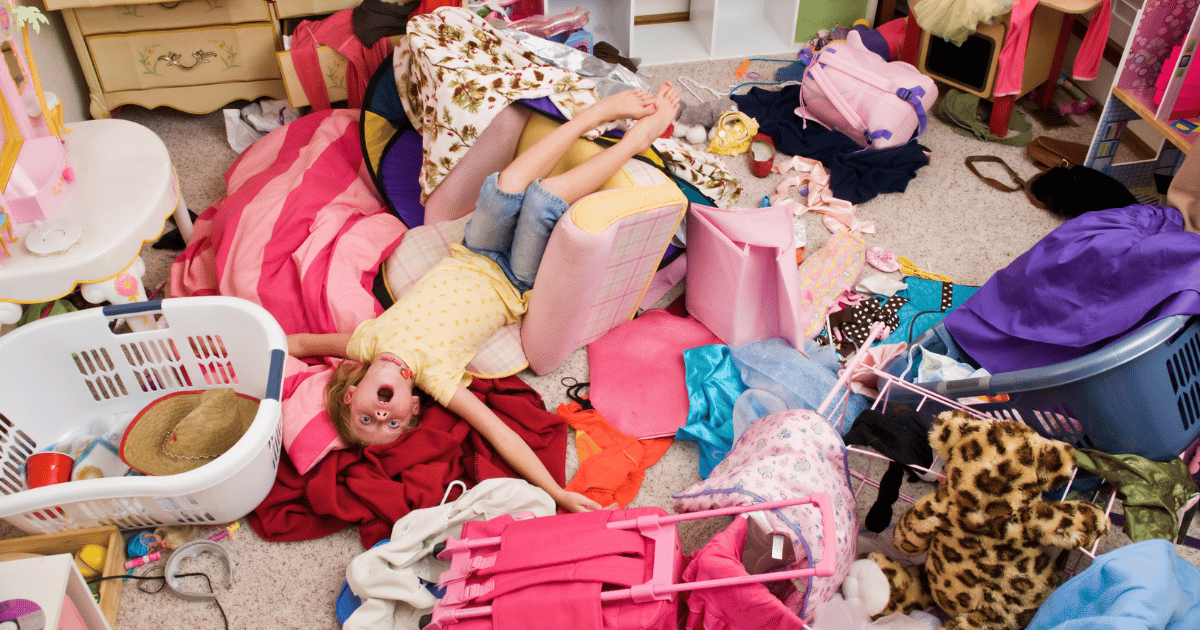
Getting our kids to tidy their bedrooms is a thankless task that can cause friction in the most peaceful of homes.
I have two teenage girls and if you also have girls, you will understand my struggles without me saying anything. OMG. They. Are. The. Worst.
I have spent 19 years trying to get some order into the hovels that pass as their bedrooms. I’ve had many fails and a few celebratory wins. Such as the time I photoshopped rat poo onto a photo of their rooms to pretend rats had got in to eat leftover food. That only worked for a period until they became more tech savvy than me and I was called out as a liar. Which shame-faced admitted I was … but I was desperate.
There were some other less inventive things that worked. So, if you’re over begging your child to “clean your bloody room” here are some ideas to encourage them with gentle persuasion and a little bit of trickery.
1. Start early
The younger kids understand the value of keeping their rooms clean and tidy, the better. According to a University of Minnesota study, kids who started doing chores at age 3 or 4 were more likely to build a lasting sense of responsibility and self-reliance into adulthood compared to kids who didn’t have chores at that age.
Because they tend to be super enthusiastic about any activity, you can involve toddlers in simple chores. For example, they can help with dusting by using socks on their hands, sorting laundry into piles and pushing buttons on appliances. They can also help their older siblings pick up stray toys on the floor. Get them while they are young and genuinely want to do the right thing. You will miss those years when they are teens.
PsychCentral says:
“Research has shown that cleaning and clean space can improve mood, give a sense of control, and reduce stress and anxiety. Cleaning also provides children with a sense of responsibility, Ferguson says. Putting the cleaning task in their hands helps promote adaptive living skills and build self-esteem.”
2. Be specific and offer help
What I consider a tidy room is very different to what my kids consider is tidy room.
Few kids know exactly how the room is supposed to look like when it’s “clean and tidy” so make sure to give directions. Be specific about what needs to be done and offer help, especially for younger children. I once suggested to my girls that a clean room is one in which we can see at least half the floor space. You see what I was up against?
If the room or the task is too big, break it down into smaller tasks that can be done in a few minutes. For example, put all toys away in the toy basket is task 1, put laundry in the hamper is task 2, and so on. You can print the list of chores and put it up on the wall so it’s easy to see. Reward charts are really helpful when it comes to incentivising good behaviour.
3. Practice cleaning
Motivate your kids to tidy their bedrooms by practicing. Because practice makes perfect!
Teach them at an early age that each mess they make is theirs to tidy up. After playing with Lego, it’s their job to put back the Lego pieces back in the box so no one trends on it (the pain!). If everyone is involved in an activity, like Halloween crafts, everyone has to pitch in and clean up after.
Playdates are another great way to get kids to practice tidying up. Make sure that cleanup is factored into playtime, and give your kids a heads up several minutes before the playdate ends so they can mentally prepare. Give them the option to tidy up along with their friend or alone after their friend leaves – they will be bossing their mate around in no time.
4. Clean bedrooms are good for their health
Another motivational tool is getting kids to understand the “why” of keeping rooms tidy. A messy home can lead to bigger and more expensive problems down the road, like pest infestations, broken devices/appliances, and chewed-up toys – hence the rat poo technique.
If you have younger kids, reading a book about germs and diseases can be a huge eye opener. Teach your kids that dirty bedrooms are filled with germs that cause diseases. Dirty bedrooms can also attract bugs, insects, mice and other icky animals that leave their poop on everything. Ewww.
4. Let them choose
Many kids avoid chores and tidying up because they have no say in the matter. Choices can give children a sense of control and ownership over a chore. If they know they have options, or they get to decide what tasks to do, they’ll be more willing to tackle the problem of a messy bedroom.
Instead of saying that they need to clean their room, give them options. Ask them if they would prefer to put toys away or tidy up their desk. Ask them if they would like to do one task today or two tomorrow.
Get your kids to tidy their bedroom
5. Be realistic
A toddler won’t have the attention span to dust an entire bedroom by themselves, and even older kids shouldn’t be expected to be up to adult level when it comes to housework.
To make tidying up less of a dreaded chore, choose age-appropriate tasks and keep each task small and realistic. Finish one task before moving to another, and praise/reward your child for each task completed.
6. Make it fun
Tidying up is faster and more fun when other people are involved, whether it’s siblings, playdates or parents. With younger children, getting the family to help can take away the dread and boredom of chores. Set a few minutes for the task, play some upbeat music and help your child tidy up.
A timer or an app that gamifies tasks is a great idea for little ones, especially for competitive kids and kids prone to meltdowns where chores are concerned. Start with 5-10 minutes on the clock, and do the task together.
8. Reward and praise
Rewards might be the motivation your child needs to tidy up their bedroom. You don’t want to bribe your kid to do housework, but incentives (along with “taxes” for infractions) can be a big help. One mum gave her kids a small allowance in exchange for keeping their rooms tidy plus bonuses for helping with other chores. She also deducted a small amount for things like leaving countertops a mess after snacking.
Rewards don’t have to be monetary. A yummy treat, more screen time, and going to the movies are all appropriate incentives for a job well done.













